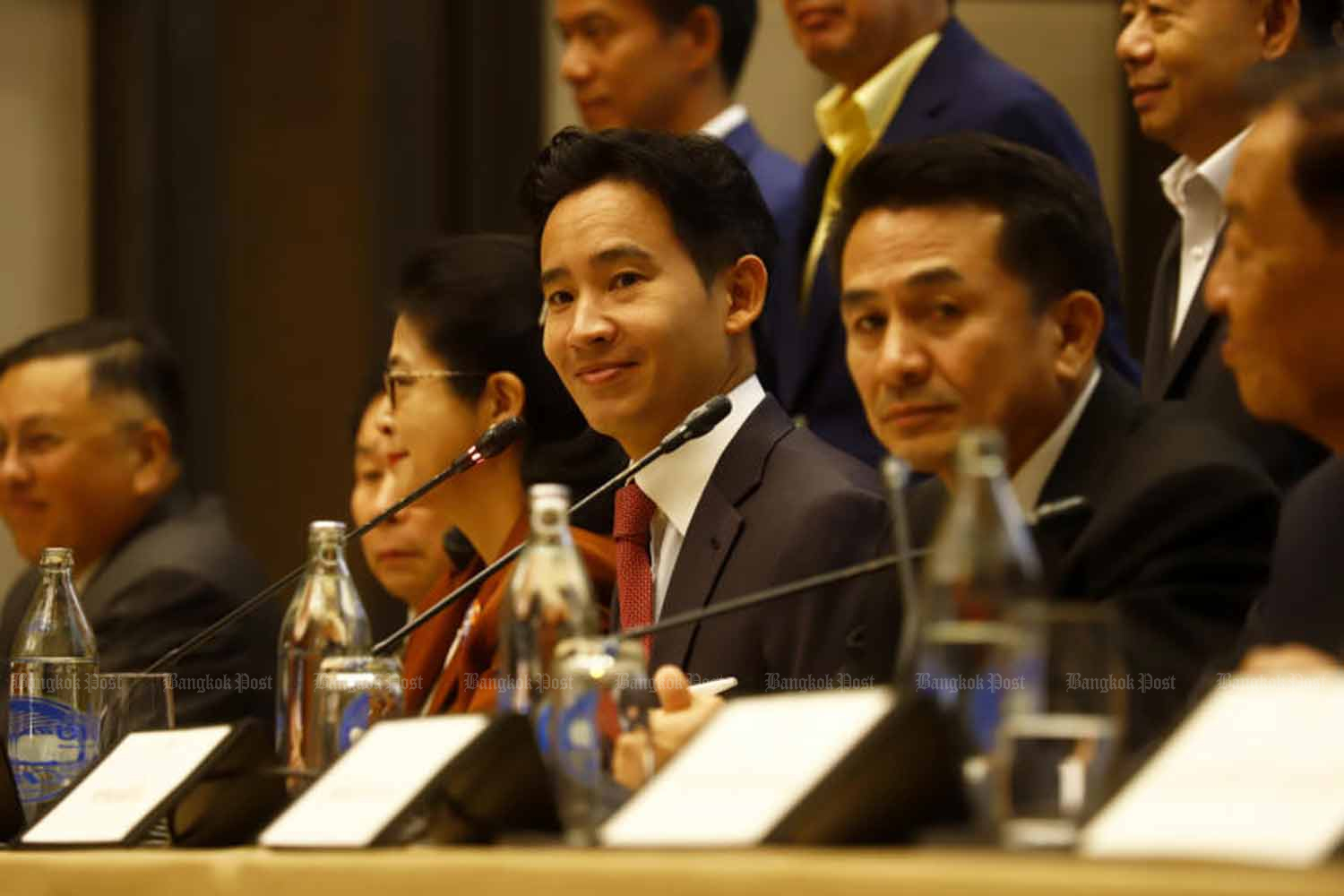
Move Forward Party (MFP) leader Pita Limjaroenrat on Thursday formally announced a plan for a coalition government consisting of 313 MPs from eight political parties, with himself as prime minister.
But signs are already emerging of possible tension between the two largest parties in the alliance: Move Forward and Pheu Thai.
Pheu Thai leader Cholnan Srikaew said his party had some reservations about the draft memorandum of understanding (MoU) that all eight parties hope to sign on May 22. Move Forward’s plan to amend the lese-majeste law could also be a point of friction, he said.
“I have seen the government coalition MoU. The main party drafted it. The Pheu Thai Party is seriously against some points in it,” Dr Cholnan said after a press conference held by the eight parties at the Okura Prestige Bangkok Hotel.
Move Forward and Pheu Thai together would have 293 seats in the House of Representatives, based on the unofficial results of Sunday’s election. The remaining 20 seats are divided among six other parties: Prachachat, Thai Sang Thai, Seri Ruam Thai (Thai Liberal), Fair, Plung Sungkom Mai (New Force) and Peu Thai Rumphlang.
Mr Pita said all the coalition parties had agreed to support him as the next prime minister as MFP won the most House seats.
“I would like to thank the people for all the votes they have given us. They represent hope and a desire for change. The new government will work with honesty and be the government of all Thai people,” he said.
Because it won 11 more seats than Pheu Thai, Move Forward will be the lead party in the coalition. It also created the first draft of the MoU, but Mr Pita has stressed that the final document will be produced by a committee in which all eight parties are represented.
The MoU will outline guidelines for the parties’ collaboration and address national, political, economic and social crises, he said.
The final details will be announced on May 22, which marks the ninth anniversary of the 2014 military coup d’état staged by Gen Prayut Chan-o-cha, who is still the caretaker prime minister until a new government is formed.
The eight parties will establish a working group to facilitate the transition from the caretaker government to the new administration. It will also consider the possibility of other political parties joining the coalition.
Mr Pita said that 313 MPs should be enough for the formation of the new government, while expressing his confidence that parliament will vote in favour of him becoming the country’s 30th prime minister.
To win the vote, support from at least 376 House members and senators will be required. The 250 senators, all appointed by the military prior to the 2019 election, have the right to vote for the prime minister alongside the 500 House representatives.
Section 112 'not in MoU'
Dr Cholnan, meanwhile, said the issue of amending Section 112 of the Criminal Code — the lese-majeste or royal defamation law — has not yet been raised in talks among potential coalition parties.
The main coalition party was open to opinions and proposed changes from partners, and subsequent discussions would determine whether the MoU could be agreed upon, the Pheu Thai leader said.
“The MoU may be the factor that determines our co-existence,” he said.
Asked if the MFP-drafted document included any change to the lese-majeste law, Dr Cholnan said it did not.
“The amendment of the lese-majeste law must be jointly acceptable to all parties,” he said.
Mr Pita on Thursday declined to comment on the possibility of amending Section 112. MFP has faced significant criticism from segments of the population who believe changing the law could erode protection of the royal institution.
Mr Pita also said he was not concerned about any complaints about his qualifications. Just prior to Election Day, a member of the Palang Pracharath Party filed a complaint with the Election Commission, alleging that Mr Pita held shares in a media company, which would be grounds for disqualification.
The company in question is iTV Plc, a broadcaster that stopped operating in 2007 and was delisted from the Stock Exchange of Thailand in 2014. The shares were held by Mr Pita’s father, who died in 2006, and the Move Forward leader is the executor of the estate. The business licence of iTV is only active today because there is an unfinished court case regarding concession fees owed to the government.
